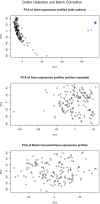Hackathons as a means of accelerating scientific discoveries and knowledge transfer
- PMID: 29650552
- PMCID: PMC5932615
- DOI: 10.1101/gr.228460.117
Hackathons as a means of accelerating scientific discoveries and knowledge transfer
Abstract
Scientific research plays a key role in the advancement of human knowledge and pursuit of solutions to important societal challenges. Typically, research occurs within specific institutions where data are generated and subsequently analyzed. Although collaborative science bringing together multiple institutions is now common, in such collaborations the analytical processing of the data is often performed by individual researchers within the team, with only limited internal oversight and critical analysis of the workflow prior to publication. Here, we show how hackathons can be a means of enhancing collaborative science by enabling peer review before results of analyses are published by cross-validating the design of studies or underlying data sets and by driving reproducibility of scientific analyses. Traditionally, in data analysis processes, data generators and bioinformaticians are divided and do not collaborate on analyzing the data. Hackathons are a good strategy to build bridges over the traditional divide and are potentially a great agile extension to the more structured collaborations between multiple investigators and institutions.
© 2018 Ghouila et al.; Published by Cold Spring Harbor Laboratory Press.
Figures






References
-
- Lapp H, Bala S, Balhoff JP, Bouck A, Goto N, Holder M, Holland R, Holloway A, Katayama T, Lewis PO, et al. 2007. The 2006 NESCent phyloinformatics hackathon: a field report. Evol Bioinform Online 3: 287–296.
Publication types
MeSH terms
Grants and funding
LinkOut - more resources
Full Text Sources
Other Literature Sources
Molecular Biology Databases
